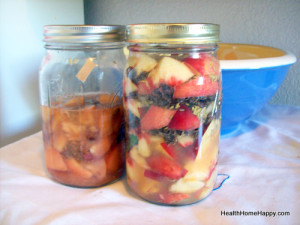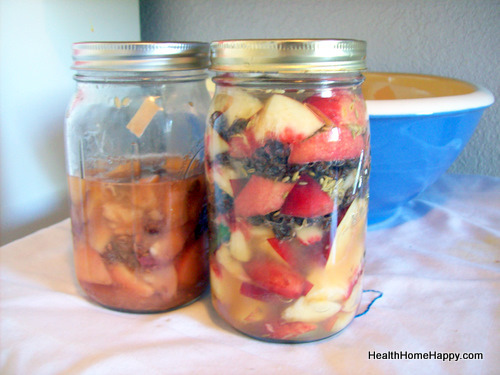Short Answer:
Yes, Fermented Vegetables are Paleo!

Fermentation
Fermentation has been around for thousands of years as a means of preserving food over a long period of time when refrigeration wasn’t yet available. It is also a way of preventing food spoilage. Fermentation can transform the flavor of food from plain to flavoursome enlivened by beneficial bacteria and enhanced micronutrients.
Lacto-fermentation is a process of fermenting foods using lacto-bacillus bacteria, a beneficial bacteria that feeds on sugar and starch producing lactic acid which not only preserves food in its state but promotes the growth of healthy flora in the digestive system.
Benefits of Fermentation
Fermented foods are vital part of a healthy diet and fermented vegetables are definitely Paleo. Some of the benefits of food fermentation are the following:
- The fermentation process preserves the food and creates beneficial enzymes, B-vitamins, omega-3 fatty acids and probiotics Probiotics help balance the bacteria in the digestive system. It is known to improve bowel movement, aids in digestion and improves immunity.
- Fermentation helps in absorbing more nutrients in food. With the balanced digestive enzymes and gut bacteria, more nutrients are absorbed in food.
- Fermentation preserves food easily and allows storing of food in longer period of time, without losing the nutrients.
- The beneficial bacteria in fermented foods are highly potent detoxifiers that are capable of drawing out wide range of toxins.
- Eating fermented foods can prevent obesity, diabeted and can regulate dietary fat absorption.
- K2 vitamins is present in fermented foods can help prevent heart disease.
- Fermentation is cheaper compared to buying and consuming probiotics supplements available in the market.
- The beneficial microbes in fermented foods can aid in good mental health, decreasing anxiety and improving metal outlook.
Traditionally Fermented Foods
Sauerkraut, which means sour cabbage, kimchi and pickles are the most well known fermented vegetable. But almost any vegetable or fruit can be used for fermentation. Fruits though, require shorter fermentation time as they already contain sugar. Below is a list of traditionally fermented foods:
· Cabbage
· Pickles
· Cucumber
· Daikon radish
· Red radish
· Carrots
· Corn relish
· Sauerruben
· cortido
· Celery
· Beets
· Turnips
· Kefir – fermented milk
· Kombucha – fermented tea
· Papaya
· Tofu
· Tempeh – made from soy beans
· Miso – paste made from soy beans, barleyor rice
· Sauerkraut – made of cabbage and salt
· Kimchi
· Ketchup
· Yogurt
How to Ferment Foods
Fermenting foods only require simple procedures and no special equipments. It is very easy and less time-consuming that you can do it yourself at home. You will only need vegetables or fruits, salt, water, some spices and a container to create your own fermented food.
First, choose the vegetable or fruit that you would like to ferment. Chop your of choice vegetable/fruit and submerge them in water to avoid mold formation. Leave some room in the container for expansion. Add salt and a few spices. The salt helps ferment the vegetables and create the right environment for fermentation. Spices you can use for fermentation could be onion, garlic, ginger and some herb spices. Next, leave it in a cool, dark sealed container for 7-10 days, in a room temperature. Taste the ferment every day to know if it is ready. Lastly, you can now refrigerate the jar of vegetables that will last for 9 months.
Eat happily. :)
What Experts Say About Fermented Foods.. Are They Paleo??
“People have been eating fermented foods for thousands of years willingly, and even longer accidentally. The evidence shows there’s definitely something to it, and I think it can be a vital part of a healthy Primal Blueprint diet”. – Mark Sisson
“Fermentation of food increases beneficial flora, like lactic acid bacteria. While our ancestors likely didn’t know this, they still used fermented foods regularly, likely due to the anecdotal results they witnessed”. – Dr. Loren Cordain
All you ever wanted to know about Fermented Vegetables and Paleo
Mark’s Daily Apple. The Definitive Guide to Fermented Foods
http://www.marksdailyapple.com/fermented-foods-health/#axzz3WiCQ5HqE
The Paleo Diet. Fermented Foods For Gut Health
http://thepaleodiet.com/fermented-foods-gut-health/
Chris Kresser. Got digestive problems? Take it easy on the veggies.
http://chriskresser.com/got-digestive-problems-take-it-easy-on-the-veggies
Wellness Mama. Health Benefits of Fermented Foods
http://wellnessmama.com/2245/health-benefits-fermented-foods/
Paleolista. Fermented Foods, Ancient Foods and Super Foods…Are They Paleo?
http://www.paleoista.com/uncategorized/fermented-foods-ancient-foods-and-super-foods-are-they-paleo/
Paleo Leap. Fermented Food Recipes
http://paleoleap.com/fermented-food-recipes/
AutoImmune Paleo. A PRACTICAL GUIDE TO FERMENTED FOODS FOR AUTOIMMUNE DISEASE
http://autoimmune-paleo.com/a-practical-guide-to-fermented-foods-for-autoimmune-disease-guest-post-by-sarah-ramsden/
Paleo Secret. FERMENTED FOODS: One of the Best Things You Can Do For Your Health
http://www.thepaleosecret.com/2013/01/fermented-foods-one-of-the-best-things-you-can-do-for-your-health/
Paleo Hacks. Everything You Need To Know About Lacto-Fermented Foods
http://blog.paleohacks.com/ultimate-guide-lacto-fermented-foods/
Paleo Diet Basics. Have You Added Fermented Foods to Your Paleo Diet?
http://www.paleodietbasics.net/fermented-foods-paleo-diet/
Nourished Kitchen. Ferments & Cultured Food
http://nourishedkitchen.com/recipe-index/ferments-cultured-food/
Mercola.com. Fermented Foods: How to ‘Culture’ Your Way to Optimal Health
http://articles.mercola.com/fermented-foods.aspx
Did we miss anything?
Comment below and let us know what you think. Do you agree with our conclusion?
photo credit: Peach Chutney before and after fermentation

